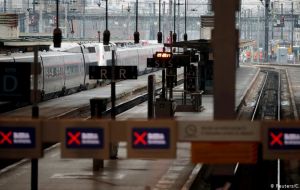MercoPress. South Atlantic News Agency
France braces for a fifth day of public transport chaos as strike against pension reform persists
 The stoppages stranded commuters, closed schools, and hit tourism and Christmas retail. Many people opted to take days off or to work from home
The stoppages stranded commuters, closed schools, and hit tourism and Christmas retail. Many people opted to take days off or to work from home French commuters and tourists braced for a fifth day of public transport chaos Monday as the government prepared to respond to widespread anger over pension reform that has sparked open-ended walkouts.
President Emmanuel Macron, Prime Minister Edouard Philippe and senior cabinet ministers met late Sunday to discuss the contentious reform, which the country's powerful labor unions claim will force many to work longer for a smaller retirement payout.
As both the government and unions vowed to stand firm, businesses started counting the costs of the strike which began last Thursday when some 800,000 people took to the streets across France in a mass rejection of plans to introduce a single, points-based pension scheme, unifying 42 existing plans.
The stoppages stranded commuters, closed schools, and hit tourism and Christmas retail.
Many people opted to take days off or to work from home, but thousands had no choice but to squeeze into perilously overcrowded suburban trains and metros whose numbers were slashed to a minimum.
The biggest labor unrest in years came as France's economy is already dented by more than a year of weekly anti-government demonstrations by so-called “yellow vest” activists protesting unemployment and waning spending power.
Many are opposed to Macron's plans for putting the country on a solid economic footing, of which the retirement overhaul forms a major part.
Business owners fear for their bottom line, with concerns over delivery of goods if the strike continues, and client numbers dwindling at the height of the Christmas shopping season.
On Thursday and Friday, strikers blocked several fuel depots around France, causing long petrol station queues as worried motorists stocked up.
The first day of the stoppage already caused an average 30 per cent drop in sales, according to the Alliance of Commerce which represents 27,000 supermarkets and clothing and shoe stores with almost 200,000 workers.
The Union of Local Enterprises warned that prolonged unrest “could be fatal for many” small businesses.
A hotel association said reservations in the larger Paris region dropped by 30-40 per cent on the first day of the strike.
But it was not only local travel that was affected. Regional and international trains, including the Thalys and Eurostar, were also hobbled by the unrest, and several flights were cancelled on the first days of the strike.
The chaos was set to continue on Monday, with the three main rail unions calling for industrial action to be stepped up ahead of another general strike and mass protests on Tuesday.




Top Comments
Disclaimer & comment rulesCommenting for this story is now closed.
If you have a Facebook account, become a fan and comment on our Facebook Page!